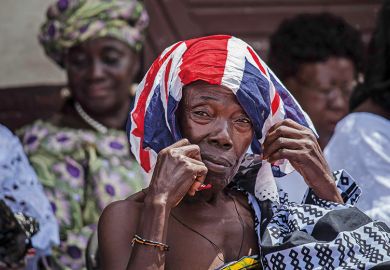The campaign to open up the state archives of apartheid-era South Africa could help researchers explore some fundamental historical questions.
On 24 August, the University of the Witwatersrand in Johannesburg held a colloquium on “promoting open and transparent public record-keeping for a democratic South Africa”.
Discussion centred around primarily “state-generated public records and government departments that keep their own records”, explained co-organiser Gabriele Mohale, archivist of the university’s Historical Papers Research Archive. Unlike in many other countries, South Africa’s National Archives has “no systematic process of declassifying records – you even have records from the Anglo-Boer War that are still not declassified”.
Those attending the colloquium included holders of archives, “archive activists”, lawyers, representatives of human rights organisations, a former Cabinet minister, a former Truth and Reconciliation commissioner and a German expert on the process by which Stasi files were made publicly available. Most of their arguments, as Ms Mohale put it, focused on “transitional justice for victims of oppression” and on what she called “administrative justice”, namely the ideal that “the archive of a state should be for its citizens; we are not seeing that happening”.
Also among the organisers were the academics who make up the Wits History Workshop. So, over and above the benefits for civil society, what might it mean for researchers to have much better access to the South African state documents now unavailable to them?
Noor Nieftagodien, associate professor of history at Wits, suggested that archived documents might reveal more about “what happened in transition”, including any “dirty deals” that took place behind the scenes, and whether this established a template for what came after.
There has been much speculation, he continued, about whether Nelson Mandela “sold out” in meetings with state officials; about “whether economic deals were struck that allowed existing powers to remain intact”; and about whether and how far the security apparatus managed to infiltrate the African National Congress. It is also sometimes assumed that one reason why current politicians get away with so much is because they know the secrets of their rivals. Scholars should now get a chance to test the truth or falsehood of all these claims; “understanding transition can help us understand South Africa today”, said Professor Nieftagodien.
Researchers based in other countries can also see new avenues for research emerging from the archives.
Philip Murphy, director of the University of London’s Institute of Commonwealth Studies, is principal investigator on the Commonwealth Oral History Project, which has conducted interviews with leading apartheid-era politicians and anti-apartheid campaigners. He is also very interested in “the mechanics of ending apartheid”, which was “the great Commonwealth crusade of the time”. Opening up South Africa’s state archives could prove immensely illuminating for researchers in both these areas.
Access to documents, Professor Murphy said, could help to determine the extent to which politicians have been honest about their actions. In retrospect, he noted, Pik Botha – the last foreign minister of apartheid South Africa – has portrayed himself as always a liberal at heart who had been constrained by the hardliners alongside him in government. Archived papers might allow scholars to “see how far the historical record bears out his public statements”, Professor Murphy said.
Yet Professor Murphy added that the archives could help to illuminate much broader questions. “One sometimes gets the impression that different elements of the South African state had different interests,” he said. “It would be very interesting to try to map them out” by comparing and contrasting the material now held, for example, by the military, the Foreign Office and the security services. Seeing more clearly “how government worked” could also throw light on the biggest question of all, he said: “What brought the regime to its knees?”
It is “broadly accepted”, in Professor Murphy’s view, that “the clincher was financial sanctions in the late 1980s. South Africa was heavily dependent on investment from outside, and the tap was turned off very quickly.” Yet scholars could understand the process in much more detail if they knew more about the inner workings of the “nexus of interests” represented by business, the government and the central Reserve Bank, which might reveal, for example, “how pressure was brought to bear on the National Party by business”.
Those who want to know how apartheid worked and how it ended can only hope that the arguments for openness put forward at Witwatersrand manage to convince the government.
Register to continue
Why register?
- Registration is free and only takes a moment
- Once registered, you can read 3 articles a month
- Sign up for our newsletter
Subscribe
Or subscribe for unlimited access to:
- Unlimited access to news, views, insights & reviews
- Digital editions
- Digital access to THE’s university and college rankings analysis
Already registered or a current subscriber?









